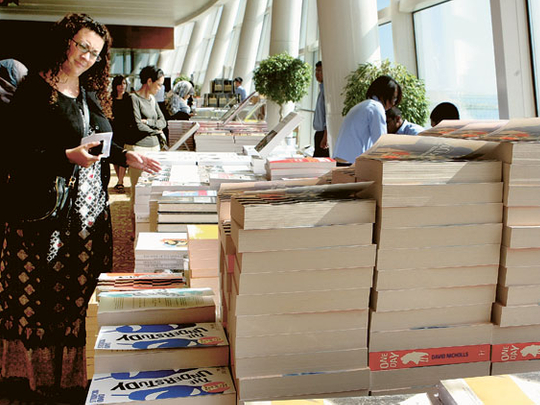
My close relationship with Dubai dates back to 1979. Since then, I have made brief, but frequent, visits, given that I have many siblings and cousins who are UAE citizens.
This year I was lucky to have the opportunity to attend the Emirates Airline Festival of Literature (EAFL) as a poet. With my Emirati poet brother Dr Shihab Ganem, I participated in a joint Arabic and English poetry recital hour.
In addition, I had the great fortune of attending several sessions by internationally renowned writers, journalists and thinkers, in a rich and diverse array of panel discussions, in-depth interviews, poetry readings, debates and workshops. For an initiative that only started in 2009, this festival is really impressive.
I could comment on several of the presentations that I attended, but I would like to use this column to discuss a famous, and for some Arabs, infamous Arab female maverick writer and thinker. She is changing how Arabs think, especially when it comes to women's rights and sexual choices — subjects that I have myself written about in my novels and blogs.
This is, of course, Dr Nawal Saadawi, now in her eighties, who received the longest applause I witnessed at this festival.
She graduated in medicine in 1955, and through her medical practice she observed women's psychological problems, which she attributed to oppression, be it cultural, patriarchal, or colonial.
In 1972, she published Al Mar'a wa Al Jins (Woman and Sex), confronting various aggressions perpetrated against women, including female circumcision; a book which lost her a job at Egypt's Ministry of Health.
Later on it landed her in prison for one year during the reign of Anwar Sadat. During her presentation at the EAFL, Saadawi described how female political prisoners were denied toilet paper, whereas the prostitutes in their own special section were issued with plenty. Ironically, she received donations of toilet paper from some of them. She used them to write her memoirs, later published as Memoirs from the Women's Prison.
Her writings in favour of women's equality and freedom of choice, including sexual choices, led to threats on her life, and demands that she be divorced by her husband. She had to live in exile for several years, until she returned to Egypt in 1996.
Paying a price
She told her audience that she was either banned from entering, or was deported from several Arab countries because of her pronouncements about the lack of democracy. As I heard her say that, I thought it was to the credit of the UAE, and the level of freedom of speech here, that she could say that at all.
One of the most resented suggestions she put forward is the abolition of religious instruction in Egyptian schools. At the festival, she suggested that Muslim school children should be exposed, not only to Islam, but also to Christianity and Judaism to the same degree. Her argument was that if they grew up recognising that the other two religions, while somewhat different, share so much with Islam, they were likely to grow up into adults who would respect adherents of other religions, instead of growing up as fundamentalists who think that their own religion is superior to all other ones, and therefore should dominate.
Humanism
Although she did not mention Buddhism or Hinduism, which are somehow routinely ignored in discussions of religion despite their billions of adherents, one could extend the concept to include them and other faiths, and indeed non-religion, such as humanism.
As someone who has been advocating respect and acceptance of all religious beliefs through my verse and two novels, as well as my Canadian radio show, appropriately named Dialogue with Diversity, I found that suggestion to be brilliant.
In fact that idea alone was worth the price of admission to the festival, as the saying goes. I was also happy to see that I was not alone in applauding the idea, judging by the audience reaction.
Today, in multicultural Canada, where I live, there is an animated discussion about allowing children of different religions the opportunity to pray during school time; for example allowing Muslim children to perform Friday prayers at noon, during school hours, and providing the necessary space and preacher for such.
Not surprisingly, there is controversy and some open resentment, partly on the basis that doing so means spending tax payers' dollars to pay for the space, and for the time of the Imam, and disrupts the hourly school schedule for non-Muslim children, especially since prayer time keeps creeping by a few minutes every week, just as does the time of iftar, during the month of Ramadan.
Others have raised the issue of human rights; because in Canada it would clearly be unacceptable to have girls pray in the back rows behind boys, or in a separate hall.
It would appear, therefore, that there is a lot to be said for this brilliant suggestion of Nawal Saadawi. The question, as always, is how do we take this idea from the stage of theory to that of practice. Let us start this urgently needed discussion.
We need some courageous community leaders, religious scholars, parents, poets, and writers to openly discuss this idea in a cool and rational manner, to arrive at a consensus, for the sake of our children and grandchildren.
You will note that I did not mention politicians. I have yet to meet a politician of true courage!
Dr Qais Ghanem is a retired neurologist, radio show host, poet and novelist. His two novels are Final Flight from Sana'a and Two Boys from Aden College. He lives in Canada.











